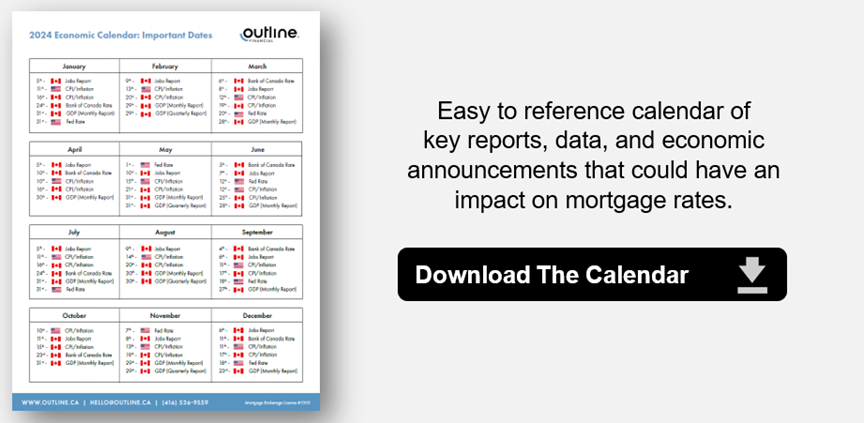2024 Economic Calendar: Important Dates

Wondering where rates are headed in 2024? While no one has a crystal ball, there are certain dates that can cause waves in the mortgage market. To help calm the waters, we’ve prepared a 2024 economic calendar with key dates of importance. While we haven’t included every date, we are trying to highlight the most relevant that could impact both fixed and variable rates, as well as the overall mortgage market.
So what reports & announcements have we included and how can they impact interest rates? Please refer to a quick summary below:
“Bank of Canada Rate” – Bank of Canada Meeting / Rate Announcement Dates: The Bank of Canada meets 8 times spread across the year where they provide an update on the economy, and announce any updates to their Overnight rate. The Overnight rate directly affects the Prime rate and Variable rate mortgages, and could indirectly affect fixed rates if changes are different from market expectations.
“Fed Rate” – US Federal Reserve Meeting / Rate Announcement Dates: Similar to the Bank of Canada Rate updates, the US Fed updates their Reserve rate. Although there is not a direct link to our Prime Rates, changes by the US Fed will influence the Bank of Canada as well as Fixed rates by impacting Bond Yield performance.
“CPI / Inflation” = Consumer Price Index (Statistics Canada / US Bureau of Labor Statistics): These are monthly reports on how inflation was for the previous month. Included is a comparison to the past month as well as the previous year. These occur in both Canada and the US. This is a key metric, where we the central banks want to see inflation come down to a certain range (target is 2% in Canada). As inflation comes under control, we will likely see the Bank of Canada reduce their Overnight rate from the current 5% as of the time of writing. Fixed rates could also see some trends downward if we see inflation cooling trends continue through 2024 & 2025.
“GDP” = Gross domestic product, income and expenditure (Statistics Canada): GDP stands for Gross Domestic Product, and is a measure of Canada’s economic performance. If we see growth cooling this may mean we’re headed for recession; in which case we may see bond yields drop potentially leading to lower fixed rates. If GDP strengthens unexpectedly, this will likely mean a surge in Bonds yields and subsequently fixed rates could rise.
“Jobs Report” = Labour Force Survey (Statistics Canada): These reports look at both unemployment and labour wage inflation. Labour wage is a key metric for future overall inflation, and so the results could impact Bank of Canada decisions on whether sustained inflation-combating measures are needed or not.
We hope you find the above information and the calendar helpful. Should you have any questions, please don’t hesitate to reach out to is and we will connect you with a top mortgage professional.
Recent Posts










GET MORE INFORMATION

